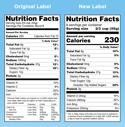Companies
Lawsuits Claim AriZona Ice Tea Misleads Consumers About Ingredients, Labeling
Irish Food Ingredient Company Licenses Enzyme That Reduces Acrylamide
 The chemical compound acrylamide, a cumulative neurotoxin formed in brewed coffee and in starchy foods heated to high temperatures, such as chips and French fries, is being targeted by governments with regulations limiting its use and adding warning labels on foods and beverages. In the meantime, Irish food ingredient company Kerry has signed a licensing agreement with Renaissance BioScience Corp. to manufacture the company’s non-GMO acrylamide-reducing yeast enzyme, Acryleast. The enzyme reduces acrylamide by up to 90 percent across food and beverage products, including biscuits, crackers, French fries, crisps, coffee, and instant food. According to Kerry, it is a clean label solution that requires minimal changes to the manufacturing process and has no impact on taste, aroma, or texture.[Image Credit: © Kerry Inc]
The chemical compound acrylamide, a cumulative neurotoxin formed in brewed coffee and in starchy foods heated to high temperatures, such as chips and French fries, is being targeted by governments with regulations limiting its use and adding warning labels on foods and beverages. In the meantime, Irish food ingredient company Kerry has signed a licensing agreement with Renaissance BioScience Corp. to manufacture the company’s non-GMO acrylamide-reducing yeast enzyme, Acryleast. The enzyme reduces acrylamide by up to 90 percent across food and beverage products, including biscuits, crackers, French fries, crisps, coffee, and instant food. According to Kerry, it is a clean label solution that requires minimal changes to the manufacturing process and has no impact on taste, aroma, or texture.[Image Credit: © Kerry Inc]
McDonald’s In The Vanguard Of Movement To Reduce Antibiotics In Beef
 With a nudge from the Natural Resources Defense Council, McDonald's announced it has told its beef suppliers around the world to cut back on the use of antibiotics beginning in 2019. Implementation will begin with pilot projects in ten markets around the world, including in the U.S. McDonald’s is the first big burger chain to launch such a policy, though other fast food leaders – Chipotle, Panera, Subway – have either cut antibiotic use in their beef supplies or have committed to do so. A spokesman for the NRDC said: “Nobody in the world sells more burgers than McDonald's, and their actions can shape the future of the industry.” Forty-three percent of medically important antibiotics sold to the U.S. livestock industry go to the beef sector, compared to only six percent for chicken.[Image Credit: © McDonald's]
With a nudge from the Natural Resources Defense Council, McDonald's announced it has told its beef suppliers around the world to cut back on the use of antibiotics beginning in 2019. Implementation will begin with pilot projects in ten markets around the world, including in the U.S. McDonald’s is the first big burger chain to launch such a policy, though other fast food leaders – Chipotle, Panera, Subway – have either cut antibiotic use in their beef supplies or have committed to do so. A spokesman for the NRDC said: “Nobody in the world sells more burgers than McDonald's, and their actions can shape the future of the industry.” Forty-three percent of medically important antibiotics sold to the U.S. livestock industry go to the beef sector, compared to only six percent for chicken.[Image Credit: © McDonald's]
ShopRite’s Partnership With Perdue Produces Antibiotics-Free Fried Chicken
 East Coast grocery chain’s partnership with Perdue Farms has led to the introduction of an eight-piece grab-and-go fried chicken item that promises “no antibiotics, ever” (NAE). The relationship with Perdue has also produced rotisserie chicken, roaster breast, and roaster leg quarters. The fried chicken is the company's newest style of NAE poultry that is hand-breaded, raised cage free and made fresh throughout the day. According to ShopRite, the products are priced at or below most conventional rotisserie and fried chicken offerings. ShopRite is the registered trademark of Wakefern Food Corp., a retailer-owned cooperative based in New Jersey and the largest supermarket cooperative in the U.S.[Image Credit: © Wakefern Food Corp, Inc.]
East Coast grocery chain’s partnership with Perdue Farms has led to the introduction of an eight-piece grab-and-go fried chicken item that promises “no antibiotics, ever” (NAE). The relationship with Perdue has also produced rotisserie chicken, roaster breast, and roaster leg quarters. The fried chicken is the company's newest style of NAE poultry that is hand-breaded, raised cage free and made fresh throughout the day. According to ShopRite, the products are priced at or below most conventional rotisserie and fried chicken offerings. ShopRite is the registered trademark of Wakefern Food Corp., a retailer-owned cooperative based in New Jersey and the largest supermarket cooperative in the U.S.[Image Credit: © Wakefern Food Corp, Inc.]
Regulation
House Lawmakers Urge FDA To Clearly Label Foods Containing Allergen Sesame

Rep. Carol Shea-Porter (D-NH) has sent a letter signed by a bipartisan group of colleagues to FDA Commissioner Scott Gottlieb urging the agency to require the clear labeling of sesame products because of the prevalence and severity of sesame allergies, and the risk of accidental exposure and allergic reactions under current regulations. According to Shea-Porter, sesame is the ninth most common food allergy among American adults and children, ranking just behind milk, eggs, fish, crustacean shellfish, tree nuts, peanuts, wheat, and soybeans. However, allergic reactions to sesame can be even more severe than reactions to these eight allergens, the letter stated. Shea-Porter is the founder of the House of Representatives Asthma and Allergy Caucus.[Image Credit: © US Govt.]
Carcinogenic Synthetic Flavors Ordered Removed From Food Products
 The FDA has ordered the removal of six artificial flavors from food products because they cause cancer in animals at doses far higher than what a person would consume. The six flavoring substances include synthetically-derived benzophenone, ethyl acrylate, eugenyl methyl ether (methyl eugenol), myrcene, pulegone, and pyridine. The substances are being removed under the Delaney Clause of the Federal Food, Drug, and Cosmetic Act. The food industry has two years to comply, though the FDA believes the ingredients are safe in the trace amounts they are used. Neither the FDA nor the Flavor and Extract Manufacturers Association responded when asked for examples of products the six ingredients are used in. But they noted that the compounds have natural counterparts in foods like basil, coffee, grapes and peppermint, and that the action does not affect the naturally derived versions.[Image Credit: © U.S. Food and Drug Administration]
The FDA has ordered the removal of six artificial flavors from food products because they cause cancer in animals at doses far higher than what a person would consume. The six flavoring substances include synthetically-derived benzophenone, ethyl acrylate, eugenyl methyl ether (methyl eugenol), myrcene, pulegone, and pyridine. The substances are being removed under the Delaney Clause of the Federal Food, Drug, and Cosmetic Act. The food industry has two years to comply, though the FDA believes the ingredients are safe in the trace amounts they are used. Neither the FDA nor the Flavor and Extract Manufacturers Association responded when asked for examples of products the six ingredients are used in. But they noted that the compounds have natural counterparts in foods like basil, coffee, grapes and peppermint, and that the action does not affect the naturally derived versions.[Image Credit: © U.S. Food and Drug Administration]
Copyright 2026 Business360, Inc.

